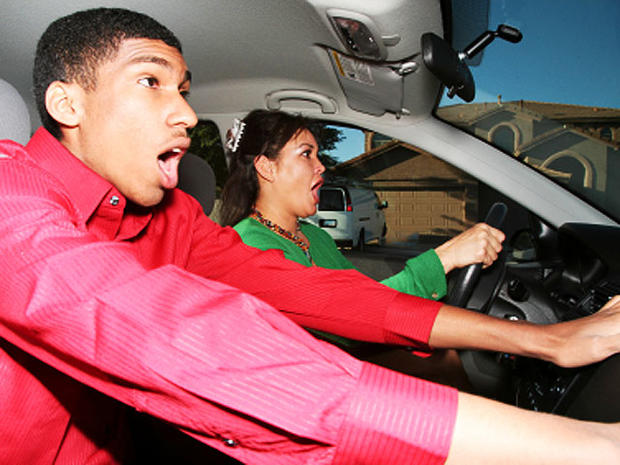Graduated driver license laws don't protect older teens: Study
(CBS/AP) Do stringent driver's license laws help keep teen motorists safe? A nationwide study shows that so-called "graduated" driver license (GDL) laws do seem to curb fewer fatal crashes among 16-year-olds but not among 18-year-olds.
Many states now require young drivers to get experience behind the wheel, including driving with an adult, before getting a license with full privileges. But those laws typically apply only to those under age 18. The new study suggests teens simply put off getting a license until they turn 18 - meaning they have little experience and higher odds for a deadly crash.
"There's an incentive right now to skip out and just wait until you're 18," said study author Scott Masten, a researcher with California's Department of Motor Vehicles. "In most states you don't even need to have driver education or driver training" if you obtain a license at 18," he said, adding that the finding was disappointing and "quite unexpected."
The study - published in Wednesday's Journal of the American Medical Association - looked at fatal crashes from 1986 to 2007 involving 16- to 19-year-olds, based on data from the National Highway Traffic Safety Administration.
An editorial by researchers with the Insurance Institute for Highway Safety accompanied the study. It called the potential effects in older teens "a serious issue deserving attention by researchers and policymakers." The editorial noted that New Jersey is one of the few states where graduated driver's licensing restrictions apply to all first-time applicants under age 21. That has led to lower crash rates among 17- and 18-year-olds.
Every state has some type of graduated driver's licensing program. These typically allow unrestricted licenses to kids under 18 only after several months of learning while driving with an adult, followed by unsupervised driving with limits on night driving and the number of passengers.
Comparing states with the most restrictions versus those with the weakest laws, there were 26 percent fewer fatal crashes involving 16-year-old drivers. But among 18-year-old drivers, there were 12 percent more fatal crashes. The differences take into account factors that would also influence fatal crash rates, including seatbelt laws, changes in minimum speed limits, and the fact that 18-year-old drivers outnumber 16-year-old drivers..
The programs appeared to have no effect on fatal crash rates for drivers age 17 and 19.
The first graduated licensing program began in 1996. Since then, the programs have been associated with 1,348 fewer fatal crashes involving 16-year-old drivers but with 1,086 more fatal crashes involving 18-year-old drivers.
During the 1986-2007 study, there were nearly 132,000 fatal crashes of drivers aged 16 to 19. Nearly 20 percent involved 16-year-old drivers, while almost 30 percent involved 18-year-olds.
The study confirms that graduated licensing "is doing what it was intended to do - prevent novice drivers from being in high-risk conditions before they're ready for it," said Dr. Flaura Winston, a pediatrician and traffic injury expert at the Children's Hospital of Philadelphia. But the results also demonstrate a need for strategies for the novice independent driver at any age, she said.
The CDC has more on teen drivers.
